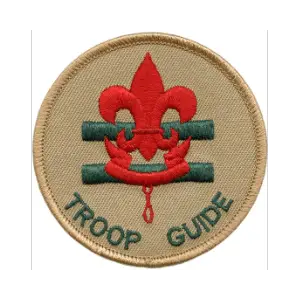One leadership position in a Scouts BSA troop is the Troop Guide. This role is usually filled by an older Scout who has a good understanding of the “Scout way” of doing things. The Scout way is much different from the “Cub Scout way” of doing things, and Troop Guides are responsible for helping new Scouts learn and adopt these new ways of doing things.

A Troop Guide is expected to lead and mentor new Scouts, helping them navigate through the various activities and challenges that come with being a part of the Scouts BSA organization. They are responsible for teaching new Scouts the basics of camping, hiking, and other outdoor activities that are a part of the Scouts BSA program. They also help new Scouts to understand the importance of teamwork, communication, and leadership.
The Troop Guide is an important leadership position in the Scouts BSA organization because they play a key role in shaping the future of the organization. By teaching new Scouts the skills and values that are important to the Scouts BSA program, they are helping to ensure that the organization continues to thrive and grow.
Any older Scout who is good with younger members of the troop is a good candidate for the Troop Guide position. If a den is crossing over to your troop, then it makes perfect sense to let the Scout who was their Den Chief when they were Cub Scouts become their Troop Guide. This is because they are already familiar with the Scouts BSA program and have experience working with younger Scouts.
Being a Troop Guide is not just about teaching new Scouts the basics of the Scouts BSA program. It’s also about being a role model and mentor to these young Scouts. Troop Guides are expected to demonstrate the values and principles of the Scouts BSA organization in everything they do. This means being trustworthy, loyal, helpful, friendly, courteous, kind, obedient, cheerful, thrifty, brave, clean, and reverent.
The description below represents an example of the requirements and expectations for this position in one troop. Specifics can vary from one troop to another.
The printable copy also includes a self evaluation form for the position on the second page. Youth leaders might benefit from self evaluating during their term. If you use this, then keep it positive with them. It should only be used to help them recognize areas they should be working on.
Troop Guide Qualifications and Duties
This is just an example. Adjust as needed to meet the size, customs, and needs of your unit.
The Troop Guide serves as a mentor and role model for new Scouts and helps them to become successful members of the troop.
Qualifications:
- Appointed by Senior Patrol Leader with Scoutmaster approval
- First Class Rank or higher (Not a BSA requirement)
Reports to: The Assistant Scoutmaster for New Scouts
Trained By: The Assistant Scoutmaster for New Scouts with the Assistant Senior Patrol Leader
May not serve three consecutive terms
Troop Guide duties:
- Help new scouts earn advancement requirements through First Class.
- Attend Patrol Leaders Council (PLC) to present plan for upcoming skill instruction. Attendance expectation 80%
- Arrive 5 minutes before the start of troop meetings.
- Prevent harassment of new scouts by older scouts.
- Help older scouts teach skills to new scouts with the guidance of the Assistant Scoutmaster for New Scouts.
- Train the Patrol Leader and Assistant Patrol Leader of the New Scout Patrol.
- Guide new scouts through early troop experiences to help them become comfortable in the troop and the outdoors.
- Teach basic scout skills.
- Participate in outings. Attendance expectation 65%
- Attend troop meetings. Attendance expectation 80%
- Set a good example.
- Wear the field uniform (class A) correctly to all regular troop meetings and religious services.
- Wear the activity uniform (class B t-shirt) to all outings and other troop activities.
- Live by the Scout Oath and Law.
- Show Scout spirit.
Frequently Asked Questions
Is there a minimum age or rank requirement for Troop Guide?
There is not a minimum set by BSA. However troops may set their own qualifications based on the size of their troop and the maturity of their troop. For example, in order to teach new Scouts the early rank skills, it might be better if the Troop Guide has already demonstrated knowledge of those skills by attaining the rank of First Class.


Leave a Reply